
Breast Cancer Treatment in Bangalore
Breast cancer is one of the most common cancers. According to the World Health Organization (WHO), it accounts for nearly 12% of all new cancer cases yearly.
In India, breast cancer represents 14% of all cancers diagnosed in women annually. These concerning statistics underscore the importance of timely diagnosis and intervention, specially when seeking Breast Cancer Treatment in Bangalore.
Dr. Manish Kumar, a prominent medical oncologist in Bangalore, emphasizes, “Early detection, combined with effective therapies, can lead to remission and improve survival rates. Therefore, awareness and timely action are critical in combating this condition.”

With over 24 years of experience in treating breast cancer and other complex malignancies, Dr. Manish Kumar specializes in medical oncology therapies. He ensures patients receive the most effective treatment tailored to their condition. Renowned for his compassionate approach and evidence-based care, he has helped countless patients achieve favourable outcomes, making him one of the most trusted cancer specialist in Bangalore.
Overview of Breast Cancer
Breast cancer occurs when abnormal cells in the breast grow uncontrollably, forming a lump or tumor. It can develop in different parts of the breast, such as the ducts, lobules, or the tissue in between. While it primarily affects women, men can also develop breast cancer, though this is rare. The exact cause is often unclear, but genetic factors, lifestyle, and environmental exposures play a role.
It is categorized based on its location, type, and spread. The two most common types are invasive ductal carcinoma (IDC), which forms in the milk ducts, and invasive lobular carcinoma (ILC), which begins in the lobules. Early-stage breast cancer may not present symptoms, making regular screenings crucial for early detection.
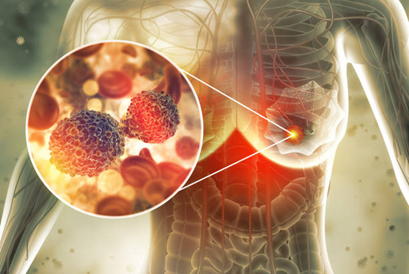
Symptoms of Breast Cancer
The signs and symptoms of breast cancer can vary from person to person. Some common symptoms to be aware of include:
Lumps in the breast: A painless, hard lump is often the first noticeable sign of breast cancer.
Changes in breast shape or size: Any unexplained change in the size or appearance of the breast should be examined by a doctor.
Pain or tenderness: Painful areas, significantly if localized to one part of the breast, should be checked.
Skin changes: Skin redness, dimpling, or puckering can be signs of breast cancer.
Unusual discharge: A discharge from the nipple, other than milk, could indicate a problem.
Swelling: Swelling in the armpits or around the collarbone can signify the cancer has spread.
Risk Factors
Gender: Women are more likely to develop breast cancer, though men can also be affected.
Age: The risk increases as you age, especially after 50.
Family history: A family history of breast cancer, particularly in close relatives like a mother or sister, increases the risk.
Genetic mutations: Certain gene mutations like BRCA1 and BRCA2 can significantly raise the risk.
Hormonal factors: Hormones like oestrogen can promote the growth of some types of breast cancer, and factors such as early menstruation or late menopause may increase the risk.
Lifestyle factors: Smoking, alcohol consumption, obesity and lack of physical activity can all raise the risk of breast cancer.
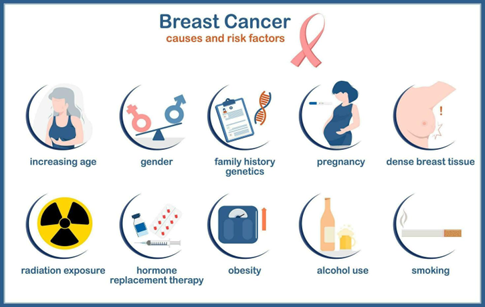
Diagnosis and Further Evaluation
Physical Exam
The doctor will begin with a thorough physical examination to feel for lumps or abnormalities in the breasts, armpits, or collarbone area.
Mammogram
A mammogram is a special X-ray used to detect breast cancer. It can identify lumps and other abnormalities that may not be visible or palpable during a physical exam.
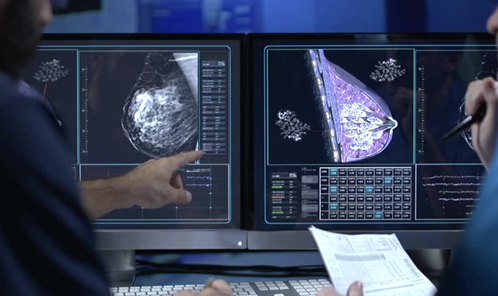
Ultrasound
An ultrasound uses sound waves to create images of the breast, helping to distinguish between solid lumps and fluid-filled cysts.
Biopsy
A biopsy involves removing a small tissue sample from the breast for microscopic examination to detect malignancy.
Magnetic Resonance Imaging (MRI)
An MRI provides detailed images of breast tissue, which is particularly helpful for women with dense breasts.
CT Scan or PET Scan
These scans check for metastasis if cancer is suspected to have spread to other body parts.
Genetic Testing
Genetic tests can identify specific genes like BRCA1 and BRCA2 that increase breast cancer risk, aiding in treatment planning.
Hormone Receptor and HER2 Testing
This test determines whether breast cancer cells have receptors for oestrogen, progesterone hormones, or the HER2 protein. This information guides treatment options since some cancers respond to hormone or targeted therapies.
Sentinel Lymph Node Biopsy
This procedure checks if cancer has spread to nearby lymph nodes, guiding the cancer stage and treatment approach.
Blood Tests
Blood tests assess overall health and detect specific cancer-related biomarkers but are not the primary diagnostic tool.
Treatment Options
Breast cancer treatment involves surgical procedures, radiation and medical oncology therapies, depending on the cancer’s stage, type, and the patient’s overall health:
Surgery
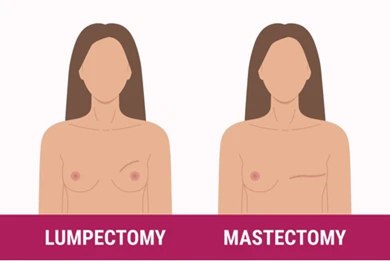
Surgery is one of the primary treatments for breast cancer. The goal is to remove the tumor or the entire breast, depending on the extent of cancer.
Radiation Therapy
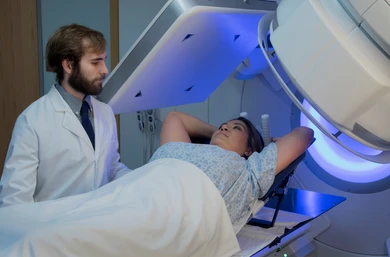
Radiation therapy uses high-energy rays to destroy cancer cells, often following surgery to prevent recurrence. It can also help relieve symptoms in advanced cancer cases.
Medical Oncology Breast Cancer Treatment in Bangalore by Dr. Manish Kumar
Chemotherapy
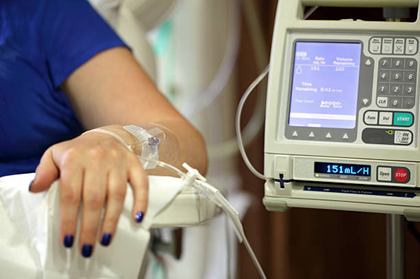
Chemotherapy uses drugs to kill cancer cells or slow their growth. It can be given before surgery (neoadjuvant) to shrink tumors or after surgery (adjuvant) to eliminate remaining cancer cells. Administration can be oral or intravenous
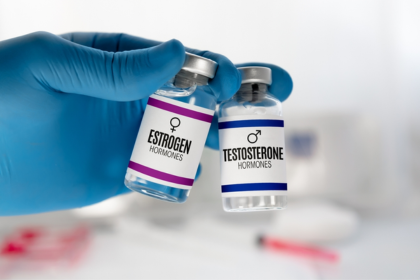
Used for hormone receptor-positive breast cancers, hormone therapy blocks hormones like oestrogen or progesterone that fuel cancer growth. Medications such as tamoxifen or aromatase inhibitors reduce hormone levels or block their effects.
Targeted Therapy
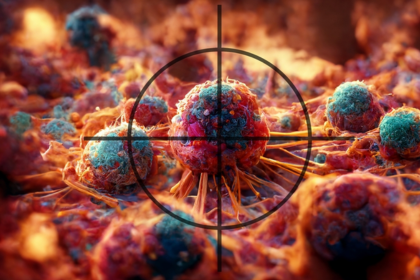
Targeted therapy drugs focus on specific proteins or genes involved in cancer growth, attacking cancer cells while sparing normal cells. This approach is often used for HER2-positive cancers or those with specific genetic mutations.
Immunotherapy
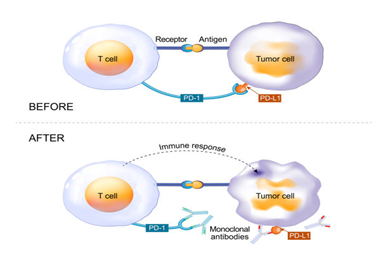
Immunotherapy enhances the immune system’s ability to fight cancer. It is particularly effective for triple-negative breast cancer. It helps the immune system recognize and attack cancer cells more efficiently.
Patient Testimonials
“After my diagnosis of hormone-receptor-positive breast cancer, Dr. Manish Kumar recommended hormone therapy post-surgery. His clear explanation of how hormone therapy works to prevent recurrence gave me confidence in my treatment plan. Over a year has passed, and I’m doing well with no signs of recurrence. I’m grateful for Dr. Kumar’s expertise.”
“Dr. Manish Kumar and his team gave me the best care during my treatment for stage 2 breast cancer. I underwent chemotherapy under his supervision. His constant reassurance and thorough follow-up after each session made me feel supported throughout. I’m now cancer-free and can’t thank Dr. Kumar enough for his dedicated approach.”
“After my breast cancer recurred, I was devastated, but Dr. Manish Kumar’s approach was nothing short of remarkable. He recommended a combination of chemotherapy and targeted therapy, and his constant support helped me regain hope. I am in remission now, and I truly believe that without his expertise and unwavering support, I wouldn’t have made it through this difficult time.”
Why Choose Dr. Manish Kumar?
Extensive Experience & Expertise
With more than two decades of expertise in medical oncology, Dr. Manish Kumar has treated numerous breast cancer patients, providing expert care for various types of breast cancer.
Comprehensive Treatment Approach
He offers personalized care through the latest advancements in chemotherapy, targeted therapies, and immunotherapy, tailoring treatment plans based on patient’s unique needs and concerns.
Expert in Handling Complex Cases
As a leading cancer specialist in Bangalore, Dr. Manish Kumar is skilled in treating complex and rare forms of breast cancer, ensuring every patient receives the best possible outcome.
Advanced Technology and Techniques
Dr. Kumar stays up-to-date with the latest medical research and utilizes state-of-the-art technology to provide cutting-edge breast cancer treatment in Bangalore.
Holistic Support Throughout Treatment
Beyond just medical care, Dr. Kumar and his team provide holistic support, including psychological counselling and nutritional advice, to help patients manage the physical and emotional challenges during treatment.

Frequently Asked Questions:
1. What is the survival rate for breast cancer?
The survival rate varies based on the stage of cancer at diagnosis and other factors. Early-stage breast cancer has a higher survival rate.
2. Can breast cancer return after treatment?
3. Is breast cancer hereditary?
4. What can I expect during chemotherapy?
5. Can breast cancer be prevented?
Disclaimer: This page is for informational purposes and not for promotional use.
